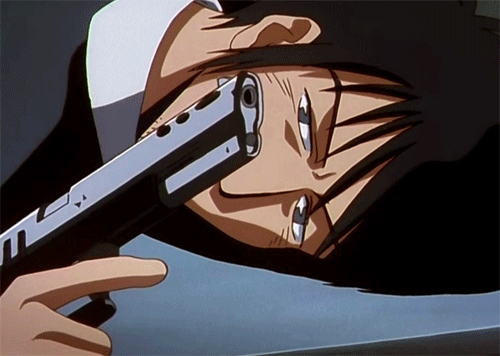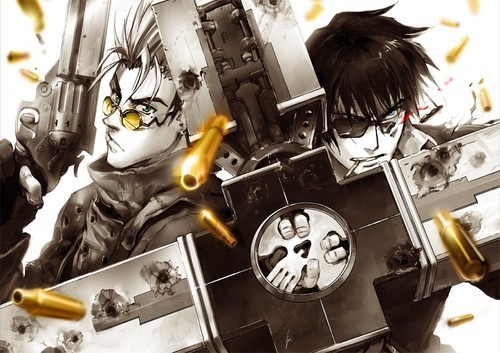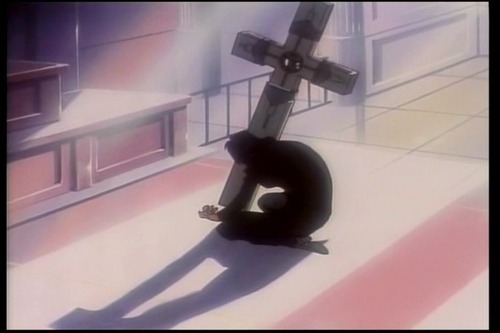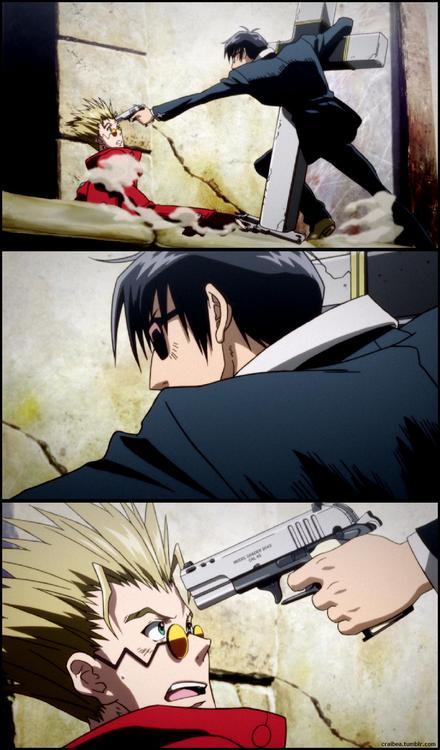Walking Contradiction
Wolfwood is another walking contradiction. Let's look at the opposites he embodies to create a fascinating character.
- Priest
- Owner of an orphanage
- Hero
- Ace gunman
- Believes men are closer to devils than angels
- Isn't even sure if he'll be Saved
- Has no problem killing when deemed necessary
- Villain
Wolfwood looks like a priest and talks like a priest, but really, Vash, who is the outlaw, is more of a saint than he is. It's an interesting reversal. While Vash tries to save everyone's lives, Wolfwood's hired to kill others (in order to provide for the kids in his orphanage of course). Unlike Vash, Wolfwood doesn't believe every life can be spared. Vash is an idealist. Wolfwood is a realist. To him, In order to save and take care of those you love, you have to kill offenders. Really, it's the same view Knives has. You have to kill the spiders to save the butterflies--it's just repackaged in a more likeable character. (and frankly, this concept is repackaged throughout the series if you watch for it.)
The fact Vash can get away without killing spiders or butterflies bothers Wolfwood, not only because he sees it as naive and unrealistic, but because being around that belief system makes him feel worse about himself. He says that the more he's around Vash, the more he's reminded of everything he hates about himself. An outlaw makes a priest feel unholy. Beautiful contradiction.
For Writers: Remember that even friends and partners have conflicts and disagreements. You can create interesting dynamics in your story by looking at both the positive and negative of your characters' relationships. Wolfwood and Vash are friends, but they rub each other the wrong way, sometimes that's a vehicle for humor and sometimes it's a vehicle for theme and conflict and identity crises


Vash believes in an ideal world, whereas Wolfwood can't. He had a harsh upbringing. Besides, it's easier for Vash to say you can come out of every situation without anyone dying--Vash is a species far more skilled and capable than humans. He is more likely to be able to save everyone.
Generations of a Belief System
It's interesting Wolfwood can't believe in the ideal when he's a priest. It's also interesting that a lot of his beliefs of the world parallel Knives'. Yup. You heard me right.Those ideas started aaaalll the way back on the SEEDS ship, when Joey tells Vash and Knives that people have to make the best choice they can think of at the time. Once Knives heard that, he put it into effect when he killed the spider to save the butterfly. He tells Vash that while they sit and hesitate, the spider will get the butterfly. That ideology is passed on to Chapel, who believes that you need to make the best choice without hesitation, because every time you hesitate--every second you spend thinking--is a second of wasted life. So that mindset gets passed onto Wolfwood, who is trained by Chapel. I'll talk about those beliefs more in Knives' character analysis.
Joey --> Knives --> Chapel --> Wolfwood

Character Arc
I love the way Wolfwood grows as a character in the series. Like many people on the planet Gunsmoke, Wolfwood has had a difficult life full of bloodshed. He tries to make the best choice of any given situation, but he's far from sinless. Wolfwood first tags around Vash because that's what he's been hired to do, but like Meryl, the more time he spends around Vash, the more he comes to understand and genuinely care about him. Like so many people in the series, Vash eventually helps Wolfwood see a better way of life.
We see that Wolfwood wants to believe in a better life, the ideal, but that he can't. Then Vash proves that an ideal lifestyle is possible. On the flying ship when the puppet master has Jessica, Wolfwood says they should let him take the girl. It's "the only logical way any of us can survive this situation.” (Side note: "Logic"--that's Knives' beliefs again. He's all about sacrificing people for the sake of logic.) But Wolfwood follows that up by saying he knows someone who has an uncanny ability to save everyone: Vash the Stampede.
And yet, through a lot of the show, Wolfwood gets fed up with Vash and (what Wolfwood believes is) his childish beliefs. When Wolfwood kills Zazie to save Vash's life, Vash gets angry with him, which offends Wolfwood--he didn't want to have to kill Zazie, but he had to in order to save those he cared about (the butterflies). I can only imagine how intense that moment was for him, because Zazie was like a child, and Wolfwood cared so much about kids. (Note that irony right there, a priest who has an orphanage has to kill a supposed orphan.) Not only does he kill Zazie for his job, but later he states that he honestly wanted to save Vash's life. So when Vash gets mad at him, Wolfwood's really not in a place to listen to his self-righteous preaching. Ultimately, though, Vash does make Wolfwood question his own lifestyle and beliefs. The very foundation of Wolfwood's whole life begins to shake.

Shortly after that incident, Wolfwood receives instruction from the Gung-ho-guns to kill Vash. If he does so, he'll get the money to care for those in his orphanage and rise in authority. Following Wolfwood's line of thinking, he must either kill Vash to save the children in his orphanage, or save Vash and let the kids suffer and possibly die at the hands of those Wolfwood works for. Ouch! That's got to be a killer. Wolfwood is willing to kill Zazie to save Vash and then is immediately after told he has to kill Vash to help his orphanage. Maybe it would have been better to let Zazie have Vash, at least then Wolfwood wouldn't have to be the one to pull the trigger. It's kind of ironic like this:
Kill child = Save Vash --> Kill Vash = Save children
Poor Wolfwood.
To make matters worse, Wolfwood understands that Vash is innately good. He sees Vash as a better person than himself, and he sees Vash suffer both physically and emotionally over and over again, while still slapping on a goofy smile. Vash is one of the last people who deserves to die. How do you kill someone who is not only a friend, but someone who values life--the life of others--so much?
But Wolfwood sets out for the hit so he can save the children of his orphanage.
When he meets Vash, he asks what Vash plans to do once he's found Knives. Vash says he doesn't know. It irks Wolfwood because it's the exact opposite of what he's been taught. Vash is hesitating and being indecisive. Wolfwood was taught to act as quickly as possible.
Vash tells Wolfwood, "When this is all over and I'm dead, promise me you'll never kill anyone again," which annoys Wolfwood even more. In his view, to be like that is to be a walking target.

Then when two of the Gung-Ho-Guns get involved and try to kill Vash, Wolfwood makes the split-second decision not to kill him (although, I think in his heart, he couldn't have done it to begin with, but he's conflicted).
What's interesting is that while Wolfwood says he can't fulfill Vash's promise not to kill anyone, he chooses to minutes later. When he has Chapel at gunpoint, he decides not to kill him.
In the end, Wolfwood chooses to follow Vash's morals. He chooses to emulate the world Vash imagines--one without bloodshed--and he chooses to be like Vash. He takes the higher road. Wolfwood shows again in the series that one can be repentant at any point in life. He decide having those high morals is worth jeopardizing his own life.
Wolfwood fulfills his promise to Vash, even though he didn't kill Vash. And then Chapel, who has always preached the importance to act without hesitation hesitates for the first time, because he doesn't want to kill Wolfwood. It's like this ripple effect. Chapel can't kill someone he loves either. Just like Wolfwood can't.
Wolfwood finally succeeds in taking the green apple from Chapel (while Chapel's hesitating, might I emphasize the significance of that), showing that he's finally bested his mentor not by killing him, but by showing him mercy. Mercy is more powerful than gunfire. It's tragic that the one time Wolfwood makes the choice not to kill anyone anymore is the time it costs him his life. (He would have lived though, if not for Legato making Chapel shoot him.)
On his way to the church, he runs into Vash, who's troubled because he failed to save Caine, who committed suicide. Wolfwood tells Vash to just be more careful next time and to forgive himself--which is exactly what Wolfwood is trying to do right now himself, so he understands his advice on a personal level.

While Wolfwood is dying, he goes to an empty church to confess his sins to God. It's ironic, because although he's a priest, he says it's his first time making a confession, and he admits that he's killed so many people and his sins are so heavy that he doesn't believe he can be atoned for. A priest who believes he can't be saved. Now that's complex. He realizes all of the mistakes he has made, and part of the tragedy of his death is that he doesn't get to live his life as a changed man. And just to add to the tragedy, we get to listen to Wolfwood say "I didn't want to die this way." It gets me in the gut.
So in the end, Wolfwood finally gains what he's always wanted but has always lacked, a belief in a better life and a better world. Even as a child he wanted a better life and a better world. That's why he shot his guardian. But he got stuck in that cycle Meryl talked about. Wolfwood calls it "a vicious cycle," suffering that leads to more suffering. Meryl refers to it as hate that leads to hate. Wolfwood finally gains a glimpse of a better life just before he dies.
For Writers: I don't even know what to say. Just admire all that complexity. Do you see the genius of irony in this story? Irony in character, relationships, and situations.
Also

Let's take a second and admire the fact that at least in this one instant, Wolfwood bested a unhuman walking disaster capable of demolishing cities and blessed with natural skills that are far superior to humans.























Great job. I got a bit emotional. Reading about the inner conflicts of Wolfwood.
ReplyDeleteThis is great stuff! Wolfwood dying reminds me of Moses getting to see the promised land but not getting to enter. He's saved but it is still bitter sweet.
ReplyDelete